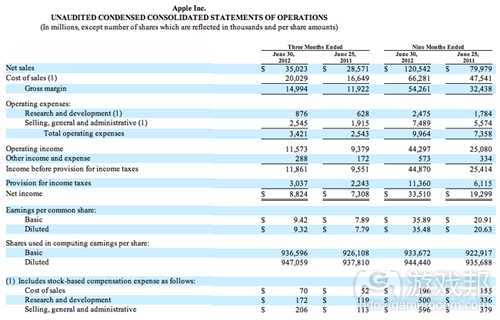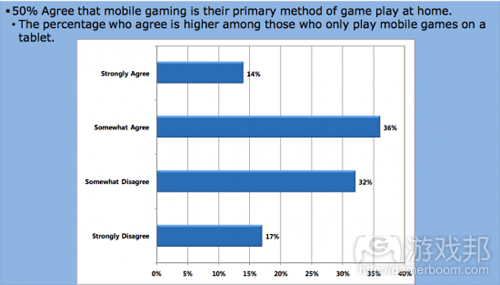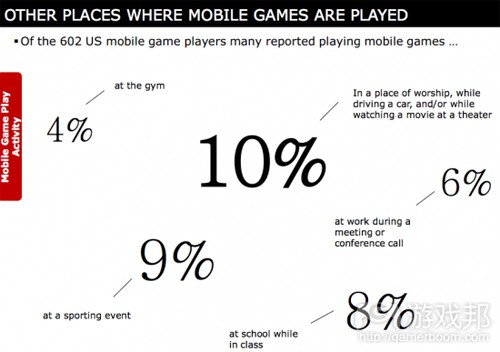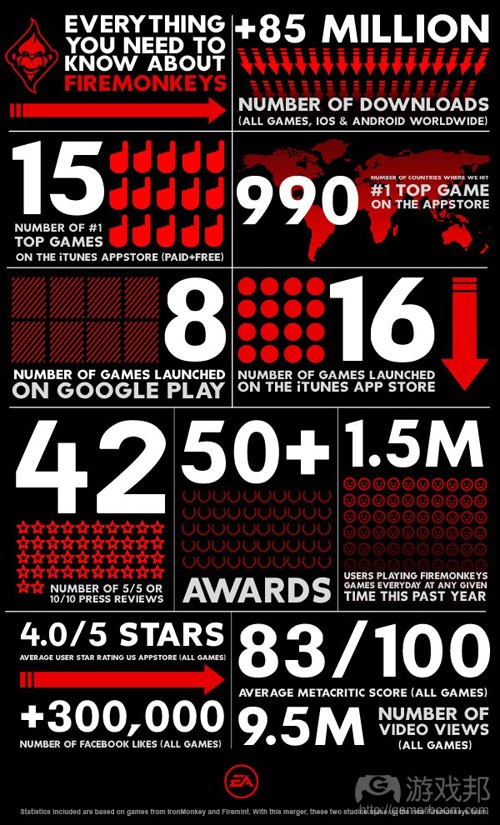每日观察:关注Facebook手机游戏玩家盈利性(7.25)
1)据insidemobileapps报道,苹果第三季度(截止6月30日)财报显示,iPhone该时期销量达2600万部,比去年同期增长28%,但比分析师预期的销量少100万部左右。
iPad同一时期销量为1700万部,iPod销量则是680万部,该季度收益为350亿美元,净利润为88亿美元;在此之前有分析师预测苹果这一时期收益约350.8亿至462亿美元。
从总体上看,苹果iOS该季度销量共4980万部,低于上一季度的5460万部。苹果在上一季度收益为392亿美元,净利润为116亿美元;苹果第三财季净利润比上一季度低24.1%。
iPhone销量虽然同比去年增长28%,但比上一季度下降25.9%,苹果将这个原因归咎于内业对新款iPhone将于今年发布的传言。
苹果海外销售额占比62%,日本是发展最强劲地区,苹果在该市场收益达20亿美元,同比去年增长33%,销量达1.73亿部;但美国仍是苹果创收水平最高的地区,其收益达128亿美元,同比去年增长26%。
与此同时,苹果在亚太地区收益同比去年下降22%,从原先的101亿美元降至78亿美元,销量下跌23%。苹果认为出现这种现象的原因是新iPad发售时未能及时登陆中国市场。
2)据insidemobileapps报道,苹果首席财务官Peter Oppenheimer近日宣布iTunes App Store应用数量超过65万款,其中iPad应用有25万款;iOS设备至今销量已突破4.1亿部。
与之形成对比的是,谷歌Android设备目前激活量也已超过4亿部,Google Play应用已超过60万款,下载量突破200亿次。
Oppenheimer表示苹果至今已向开发者分成55亿美元,超过1月份所公布的40亿美元。这意味着App Store自上线以来已创收78亿美元,苹果从30%抽成中获利23.4亿美元。
由此可推算iTunes App Store在过去两个季度中的销售额达21亿美元,分析师Horace Dediu预测App Store在2012年销售额将达42亿美元。
3)PopCap Games最近调查报告显示,50%英美手机游戏玩家将移动设备视为自己的主要家庭游戏平台。
多数手机游戏玩家表示,他们最喜欢在沙发或床上玩手机游戏;有10%玩家还会在做礼拜,开车或看电影过程中玩手机游戏。
“硬核手机游戏玩家”仍是最具消费潜力的群体,他们今年打算在游戏中投入的平均消费额为49.63美元,而普通付费玩家的这一数据则是29.04美元,此外硬核玩家在游戏虚拟货币中的消费额也比其他玩家多40%左右。
4)据pocketgamer报道,PopCap游戏《宝石迷阵》品牌经理Giordano Contestabile在最近采访中表示,目前市场上的游戏玩家超过10亿,有5亿以上玩家曾接触过《宝石迷阵》;手机已经成为多数人的头号游戏设备。
他称能够持续连网的设备及社交平台上的免费模式,就是游戏行业的未来。现在仅有20%的《宝石迷阵闪电战》iOS用户是通过Facebook访问游戏,因为人们在手机上玩游戏的方式与Facebook并不相同。《宝石迷阵闪电战》在iOS平台上的ARPU值比Facebook版本高229%。他认为苹果创造了一个出色的平台,支持信用卡用户快捷完成支付操作,Facebook虽然也表现不俗,但仍然不及苹果。
在Contestabile看来,如果使用得当,iOS上的推送通知功能就可成为最强大的营销工具。跨平台游戏具有很大发展潜力,但采用这种方式时需考虑各个平台的界面因素,例如在Facebook平台人们可以方便访问自己社交圈中的好友,但手机用户并不一定要与自己的现实好友玩游戏。
5)据insidemobileapps报道,Facebook游戏战略合作伙伴经理Sara Brooks在最近的Casual Connect大会上表示,通过Facebook登陆的手机游戏玩家可为开发者创造更多收益。
Brooks在会上分享了一些绑定Facebook登陆方式及病毒式分享工具的开发商数据指出,《Are You Smarter Than 5th Grader》开发商Ludia发现,通过Facebook登陆的该游戏手机用户所创造收益占比70%,约50%手机游戏玩家是通过Facebook登陆该游戏。《Bingo Bash》开发商BitRhymes Inc.报告称其Facebook手机游戏玩家访问游戏次数比普通用户多65%,在游戏停留时长也多30%,并且消费额也比非Facebook登陆用户多80%。
据其所称,《War Commander》开发商Kixeye也发现通过Facebook App Center页面进入游戏的玩家ARPU值也高于一般用户(游戏邦注:Facebook开发者博客最近还提到了《War Commander》这款在App Center评价最高的应用。该游戏目前有39万DAU,这些日活跃用户平均每次玩游戏时间达38分钟,自植入World Map功能后,这款游戏DAU增长了66%)。
6)据Techcrunch报道,EA日前宣布合并IronMonkey和Firemint两个手机游戏工作室,并将其命名为Firemonkeys。 IronMonkey仍将在EA澳大利亚墨尔本总部运营,主要任务是制作新原创游戏,同时扩展现有品牌内容。
IronMonkey(于2010年初被EA收购)之前主要工作是将EA热门作品植移到移动领域(例如《质量效应:渗透者》、《死亡空间》、《The Sims FreePlay》等),Firemint(于2011年5月被收购)则推出了《Flight Control》、《实况赛车》和《Spy Mouse》等一系列热门手机游戏。
IronMonkey现在成了澳大利亚最大的手机游戏开发工作室;其所有游戏在iOS和Android平台下载量超过8500万次,有8款游戏登陆Android平台,在iOS平台则推出了16款游戏。这两者在业内已收获50多个奖项,其游戏在iTunes App Store平均得分都超过4颗星(满分为5颗星)。(本文为游戏邦/gamerboom.com编译,拒绝任何不保留版权的转载,如需转载请联系:游戏邦)
1)Apple revenues hit $35 billion in lower than expected, but still record third quarter
Kathleen De Vere
Apple has posted third quarter results on the low end of expectations, selling 26 million iPhones, 17 million iPads, 6.8 million iPods and generating $35 billion in revenue for the quarter. The company’s quarterly net profit was $8.8 billion, up 20.3 percent percent year-over-year. Earnings were $9.32 per diluted share. The company also announced it would pay a cash dividend of $2.65 per share.
While Apple didn’t meet Wall Street’s expectations, Apple’s chief financial officer Peter Oppenheimer said the company had posted its best-ever June quarter, surpassing its own goals for both iPhone and iPad sales.
Prior to today’s announcement, analysts had estimated the company would earn anywhere from $46.2 billion in revenue on the high end to $35.08 billion on the low end. Overall Apple sold 49.8 million iOS devices during the quarter that ended on June 30,2012, down from Q2 2012 when the company sold 54.6 million iOS devices.
During the previous March quarter, the company posted $39.2 billion in revenue and $11.6 billion in net profit. Overall Apple’s profit was down 24.1 percent quarter-over-quarter.
Although iPhone sales were up 28 percent year-over-year, they were down 25.9 percent from Q2′s figures, when the company sold 35.1 million iPhones. Apple blamed the decline in iPhone sales on what it called “rumours and speculation” surrounding a new iPhone.
Last year Apple experienced a similar downturn in iPhone sales as consumers held off on their purchases in anticipation of what turned out to be the iPhone 4S. Pent up demand for a new iPhone allowed Apple to sell more than 4 million iPhone 4S’ during its launch weekend, which likely means today’s dip is a precursor for another record quarter in the fall.
iPod sales also continued to decline, falling 13.2 percent quarter-over-quarter and 10 percent year-on-year.
iPad sales proved to be the star of Apple’s third quarter, rising 44 percent over Q2’s figures and 84 percent year-on-year. Apple credited the increase to strong sales of the new iPad, the reduced price of the iPad 2 and growth in the educational sector.
Apple’s gross margin for the quarter was 42.8 percent, up from 41.7 in Q3 2011, but lower than the 47.4 percent gross margin Apple reported last quarter.
International sales accounted for 62 percent of the quarter’s revenue. Japan was the region with the strongest growth, posting a 33 percent increase in revenues year-over-year to $2 billion in sales of 173 million units. Apple’s most profitable region was the Americas, where revenues rose 26 percent year-over-year to $12.8 billion.
Although regional revenues did increase on year-over-year basis, they all fell on a quater-over-quarter. Apple’s revenues in the Asia Pacific region fell by 22 percent quarter-over-quarter, dropping from $10.1 billion to $7.8 billion as sales decreased by 23 percent — the biggest regional drop Apple reported. The company blamed the quarterly drop on the new iPad, which was not available in China at launch.
Apple finished Q3 with an additional $7.9 billion on hand in cash, bringing its total reserves to $117 billion. According to a statement provided by chief financial officer, Peter Oppenheimer, Apple is predicting fourth quarter revenues of $34 billion and diluted earnings per share of approximately $7.65.
Apple’s stock fell by 5.45 percent on the news in after hours trading, dropping $32.74 to $568.18, although the stock closed officially at $600.92.(source:insidemobileapps)
2)iOS leapfrogs Android with 410 million devices sold and 650,000 apps
Kathleen De Vere
The number of iOS device sales have once again passed the number of Android device sales. During today’s Q3 earnings call, Apple chief financial officer Peter Oppenheimer reported that 410 million iOS devices have been sold to date. According to the latest numbers revealed by Google at its annual I/O developers conference, Android has seen more than 400 million device activations to date.
Oppenheimer also reported the iTunes App Store now has more than 650,000 apps, 250,000 of which were developed for the iPad. By comparison, at I/O Google reported its official Android app store Google Play now has more than 600,000 apps and has driven more than 20 billion downloads.
During today’s earnings call Apple reported it had sold 26 million iPhones, 6.8 million iPods and 17 million iPads in the quarter ending June 30, 2012, generating $35 billion in revenue. Although it fell short of analyst’s estimates for sales and revenue, it was Apple’s best-ever June quarter, earning the company a net profit of $8.8 billion, up 20.3 percent percent year-over-year.(source:insidemobileapps)
Apple has now paid $5.5 billion to developers over lifetime of its app store, set to hit $4.2 billion in app sales this year
Kathleen De Vere
Apple’s chief financial officer Peter Oppenheimer said today that the company has now paid out more than $5.5 billion to developers, up from the $4 billion the company reported in January.
This implies the App Store has generated more than $7.8 billion in revenue over its lifetime, and Apple has earned roughly $2.34 billion dollars from its 30 percent cut of revenues.
Earlier this year, we estimated the iTunes App Store had generated a total lifetime revenue of $5.7 billion, based on figures Oppenheimer revealed during Apple’s Q1 earnings call.
Today’s update means the iTunes App Store has seen sales of $2.1 billion dollars over the past two quarters, a phenomenal figure given the fact that app sales were not bolstered by holidays or the release of a new iPhone. Today’s numbers indicate the iTunes App Store is on track to hit $4.2 billion in sales for the year, right on track with analyst Horace Dediu’s earlier estimates.
While Apple’s third quarter earnings fell slightly short of analyst estimates with $35 billion in revenue through sales of 26 million iPhones, 17 million iPads and 6.8 million iPods, Oppenheimer reported it was the company’s best-ever June quarter.(source:insidemobileapps)
3)Mobile gamers favour mobile devices for home use
by Mike Shaw
Half of US and UK mobile gamers see mobile devices as their primary home gaming platform.
Mobile gaming no longer means gaming on the go.
A new survey by PopCap games has revealed that an amazing 50 per cent of all US and UK mobile gamers regard mobile devices as their primary home game platform.
The research also found that most mobile gamers say their favourite place to play is either on the sofa or in bed. No great surprise there.
Dennis Ryan, VP worldwide publishing at PopCap, said: “We already know that people play mobile games ‘on the go,’ but now we are seeing mobile gamers largely favour their mobile devices for home use.
“If you add the fact we are seeing a deluge of new gamers coming in through mobile, we believe mobile gaming is invading the last bastion of video game consoles and personal computers: the home.”
Among the data are some interesting stats surrounding a group PopCap have labelled ‘naughty gamers’. Naughty gamers are those who have played a mobile game at a place of worship, while driving or at the cinema.
While a more sensible tag might be ‘hardcore mobile gamers’, the fact remains that this group spends far more on mobile gaming than others surveyed. In 2012 alone they plan to spend an average of $49.63 versus an average of $29.04, and they spend about 40 per cent more on in-game currency.(source:mobile-ent)
4)Casual Connect 2012: If you use them properly, push notifications are the best marketing tool says PopCap’s Contestabile
by Jon Jordan
“The past years have seen the most change in the 12 years of Bejeweled,” said Giordano Contestabile, brand manager for Bejeweled at PopCap.
More than one billion people are now playing games and more than 500 million have played Bejeweled in some form.
Contestabile said the big opportunity for the future billions of new gamers is mobile, because people are play mobile all the time.
“Mobile is the #1 gaming device and the only game device for most people,” he argued.
Similar, different
The future, he said, was freemium on always-connected devices and social, because you can connect with your real friends – but as importantly on mobile, people you don’t know.
Only 20 percent of Bejeweled Blitz’s iOS players connect via Facebook, because play patterns on mobile are very different.
Indeed, talking about taking Bejeweled Blitz cross-platform, Contestabile said than on iOS, ARPU is 229 percent higher than Facebook.
Apple has built a great platform. Everyone has a credit card and they can pay in one step. Facebook is good too, but not as good yet, was his comment on the situation.
He added, “Push notifications [on iOS] are the single most important marketing tool, if you use them in the right way”.
“There is a huge opportunity for cross platform games but you have to approach them in different ways,” he said.
For example, interface is very important for each platform. While on Facebook, the social graph is embedded, but as proven in the previous stat, on mobile people don’t always want to play with their real friends.
Future shock
As for the future of cross-platform gaming, Contestabile pulled out some possible trends.
He said asynchronous gaming would continue to be very popular, while big publishers would push companion apps, which would become more integrated.
This would culminate with games sharing a back-end, resulting in customised game experience for each player, depending on the devices with which they access the game.
This could even result in meta-games where players in shooter could have their environment changed by players on a real-time strategy game, or power ups unlocked by teams playing a match-three puzzler.(source:pocketgamer)
5)Facebook mobile game users play longer, spend more
AJ Glasser
Mobile game players logged in via Facebook generate more revenue for developers, Facebook Games Strategic Partner Manager Sara Brooks said today during a Casual Connect presentation.
The session, titled “Unlock New Frontiers of Growth with Facebook,” primarily covered the expansion of Facebook-based social games into both established casual game genres and into international territories. At the end of the presentation, however, Brooks shared interesting statistics reported by mobile game developers that feature Facebook-enabled logins and viral sharing tools. According to Are You Smarter Than a 5th Grader developer Ludia, mobile users logged in through Facebook generate 70 percent of the game’s revenue for the platform. Roughly 50 percent of its total mobile player base is logged in via Facebook. Bingo Bash developer BitRhymes Inc. reported that its Facebook mobile players engage in 65 percent more sessions, play 30 percent longer and spend up to 80 percent more than non-logged in players.
These stats are no doubt meant to convince game developers that Facebook still represents opportunity, particularly on mobile devices. Many developers are disillusioned with the platform given Zynga’s dominance, issues with discoverability prior to the launch of App Center and rising user acquisition costs. Even with all those marks against it, however, Facebook still boasts some of the highest average revenue per user rates among games platforms. App Center could even increase ARPU on Facebook. According to Brooks, War Commander developer Kixeye sees higher ARPU from users coming in from the game’s page on App Center.(source:insidesocialgames)
Facebook highlights War Commander — Facebook highlighted Kixeye’s War Commander on its developer blog for being one of the top rated apps in the App Center. War Commander currently has 390,000 daily active users who on average play 38 minute sessions. Since implementing the World Map feature, which lets players explore and control territory, the game has seen a 66 percent increase in daily active users.(source:insidesocialgames)
6)EA Mobile Moves: IronMonkey & Firemint Merge Into “Firemonkeys,” Now Have 50M Players Between
Rip Empson
Electronic Arts announced today that it is merging two top mobile game studios, IronMonkey and Firemint, which will fittingly combine to create a new company, called Firemonkeys. (All parties are awarded 50 points for the awesome portmanteau.)
For those unfamiliar, IronMonkey is probably best known for adapting popular EA titles to mobile, like Mass Effect Infiltrator, Dead Space, and The Sims FreePlay. Freemint, meanwhile, has produced a number of its own popular games, including Flight Control, Real Racing, and SPY Mouse — to name a few. Both studios are currently subsidiaries of the gaming giant, which acquired IronMonkey in early 2010 and Firemint in May 2011.
The rebranded operation will continue to work out of EA’s Australian headquarters in Melbourne, where the teams will be tasked with creating new, original titles, while expanding on their existing catalogs. Going forward, EA has made it clear that it will be pinning much of its hopes on expanding into mobile, with a focus on free-to-play games monetized by in-app purchases.
But, in the long-term, EA can’t just rest on its laurels, squeezing pennies out of its successful franchises, it will have to create engaging, original titles for new generations of gamers. Big ticket acquisitions of PopCap and Playfish have made it clear that the company’s future lies in mobile and social.
As for the new Firemonkeys, IronMonkey General Manager Tony Lay told GameSpot that it wants to “sit shoulder to shoulder with EA studios, like DICE and Criterion,” and he believes that the team will get there by having IP ownership. “I want us to be seen as a creative entity, not simply a porting house,” the GM said.
And, abroad at least, many will be looking to Firemonkeys for leadership. The merger creates the largest game development studio in Australia, EA said today, as the studios’ games have collectively seen 50 million players in 2012 as well as more than two decades of experience between them.
The teams have already basically been working side by side, and the merger really just makes that relationship official, allowing the two teams to pool resources and collaborate on projects when mutual interests and strengths align. Smartphone growth is exploding both in Australia and in neighboring regions and Firemonkeys leadership says that it wants to leverage this adoption to increase brand recognition and become a new center for producing creative IP.
While it already stands as Australia’s largest mobile games studio, EA was quick to point out that it’s looking to expand further and is currently hiring for a number of positions.(source:techcrunch)














































 闽公网安备35020302001549号
闽公网安备35020302001549号